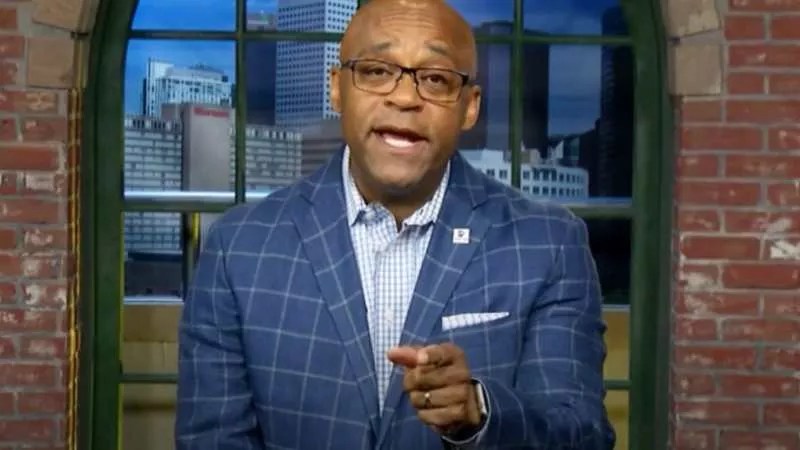
City of Denver via YouTube

Audio By Carbonatix
During a June 24 press conference discussing Denver’s response to COVID-19, Mayor Michael Hancock said that the city is preparing to address homeless encampments that have sprung up around Capitol Hill and downtown, despite recommendations against such actions during the pandemic from the federal Centers for Disease Control and Prevention.
“You cannot try to guard against one virus, one public-health challenge, while allowing others to exist,” Hancock said in reference to sites such as one that’s grown near Morey Middle School in the Capitol Hill neighborhood. “That’s the balance we need to walk. Some of these encampments have spiraled into acute public-health threats, matters of great concern, where you’re allowing needles and other unhealthy conditions to exist.”
During this discussion, Hancock was joined by a slew of city officials, including Denver Public Health and Environment Executive Director Bob McDonald, Office of Emergency Management Executive Director Matt Mueller, Department of Housing Stability Executive Director Britta Fisher and Denver Police Chief Paul Pazen.
In his opening remarks, Hancock used a football metaphor to characterize the three months since Denver issued its stay-at-home order in an effort to slow the spread of the novel coronavirus. Back then, he said, the disease had the city and its residents pinned against their own one yard line. Today, he noted, we’re still in the first quarter, but we’ve managed to advance the ball to the twenty, beyond the shadow of our own goalposts.
Hospitalizations continue to trend downward, Hancock stressed, but he acknowledged that there has been an uptick in COVID-19 cases. Because positive diagnoses are currently at around 3 percent, below the 5 percent goal set by state officials, Denver remains in a stable situation – but if best safety practices aren’t followed, he added, the situation could devolve, as seen in Texas, Florida and several of Colorado’s neighboring states, and further lifting of restrictions might have to be delayed.
In a casual shot at President Donald Trump, Hancock said that he doesn’t take testing and contact tracing “as a joke,” noting that the city has lately met or surpassed the 1,100 daily tests it needs to conduct.
This bright point was followed by a far pricklier issue: homelessness. “We need to redouble our efforts to change how we support our residents experiencing homelessness, including more 24-hour options – and we are not oblivious to the encampments that have sprung up around our city,” Hancock said. “They’re of great concern. We’re working to strategize how we can continue to address the encampments, which have become a public-health threat, and we’re going to have to clean them up to keep everyone healthy.”
From there, Hancock shifted back to the city’s response to the pandemic, including the likelihood that Denver’s order mandating masks in many public places will remain for the foreseeable future. McDonald then picked up the topic, noting that officials should have a better idea in the next week or so if the rising COVID-19 case counts can be connected to factors such as the downtown demonstrations, Memorial Day celebrations and greater access to bars, clubs and restaurants, some of which haven’t been strictly following capacity guidelines. McDonald estimated that the city is receiving 100 complaints per week about such concerns, and is trying to respond to all of them within 24 hours.
During the question-and-answer session, many of the inquiries brought the panelists back to homelessness.
Hancock bristled at the implication that Denver was going against CDC advice regarding homeless encampments, and insisted that most of those deemed risky have been cleaned up without displacing individuals staying there – a claim that is certainly debatable, given the clear-out of a Five Points encampment last month in which the unhoused were told not to return for days.
Also pushing back was McDonald, who said officials have been in communication with the CDC about how to address other public-health concerns without increasing dangers related to COVID-19. “Given those conversations, I’m confident we are aligning with their factors and balancing the various public-health threats,” he said.
Fisher described the city’s attempts to protect homeless individuals, citing 1,065 beds made available through auxiliary shelters and 180,000 meals served at sites such as the Denver Coliseum and the National Western Center, not to mention 1,021 units of financed housing and 1,066 additional residences that are slated for groundbreaking over the next year. “Is it everything? No,” she conceded. “We know we need to do more, including using federal resources to leverage the best possible outcomes we possibly can.” Denver is in “a budget-restrained environment,” she acknowledged, but is continuing to invest in long-term solutions for the homeless.
After a discussion about calls for the removal of Denver’s Christopher Columbus statute, which are under study, and Pazen’s warnings about the proliferation of illegal fireworks, Hancock offered some closing takes on the encampments. “I can’t give a timeline” for when officials will address them, he said, but he wants to avoid the kind of confrontations that could endanger both residents and city employees.
“We don’t need that type of engagement,” he emphasized. “It’s easy to demonize government when we’re trying to do what we can to create balance and help folks. We’re not trying to hurt our neighbors who are experiencing homelessness. I want people to hear that loud and clear: If we’re able to help them access services, there’s a greater probability to move them to a more stable lifestyle…. Anything short of that I find inhumane.”
As he put it, “We can do better. We have to do better. And we want to do better.”